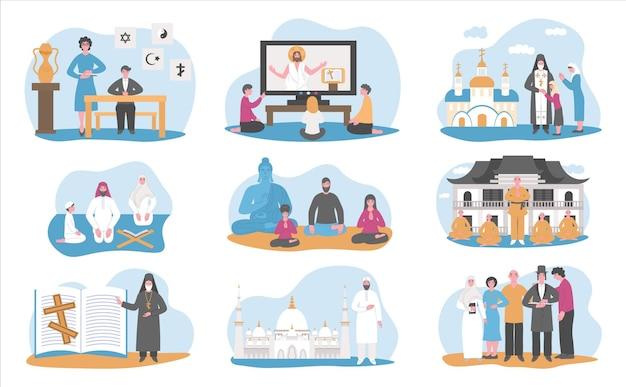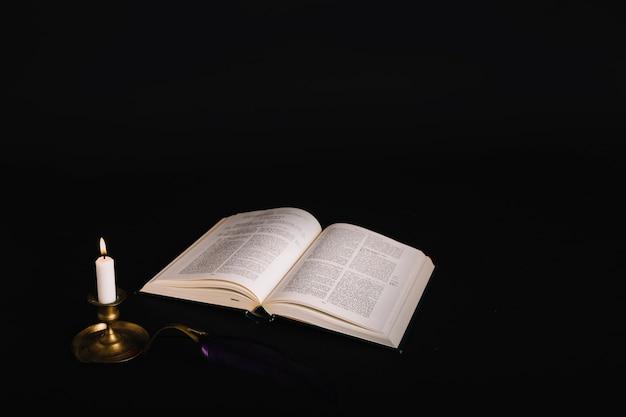Religion is an integral part of human culture, shaping beliefs, values, and practices across the globe. While there are numerous religions, each with its unique spiritual texts, some have gained prominence due to the vast number of followers they have amassed. In this blog post, we will explore the six main religions and their holy books that continue to guide and inspire millions of people worldwide.
From ancient scriptures to modern teachings, these holy books hold immense significance for believers, offering guidance, moral principles, and a deeper understanding of their respective faiths. So, if you’ve ever wondered what the holy books of the world’s major religions are, you’re in the right place! We’ll delve into the sacred texts of Christianity, Islam, Hinduism, Buddhism, Sikhism, and Judaism.
Let’s embark on a fascinating journey to discover the essence of these religions, their revered texts, and the wisdom they impart, shedding light on the depths of human spirituality. Are you ready to dive into the world of ancient wisdom and modern faith? Let’s begin exploring the holy books that shape the beliefs of billions of people worldwide.

What Are the 6 Main Religions’ Holy Books?
Christianity: The Bible
Christianity, one of the world’s largest religions, has its holy book known as the Bible. This ancient tome is a compilation of multiple books, containing the Old Testament and the New Testament. It’s like the greatest hits album of religious texts. The Bible covers everything from creation to redemption, with a healthy dose of miracles and teachings from Jesus thrown in. It’s like a marathon of divine storytelling that keeps you hooked till the very end.
Islam: The Qur’an
In the world of Islam, the holy book is the Qur’an. It’s a bit like a spiritual GPS, guiding Muslims through life with its verses. Written in classical Arabic, the Qur’an is believed to be the direct word of Allah as revealed to Prophet Muhammad. It’s a comprehensive guide for Muslims, covering everything from ethical principles to legal rulings. Plus, it’s full of beautiful imagery and poetry that will make you say, “Holy Qur’an!”
Hinduism: The Vedas
The Vedas, the sacred texts of Hinduism, are like an ancient Indian library of esoteric knowledge. Considered the oldest written texts in the world, they’ve been passed down from generation to generation for thousands of years. The Vedas are a collection of hymns, rituals, and philosophical discourses. They explore profound questions about the nature of existence and the divinity within us all. Reading the Vedas is like embarking on a philosophical journey that takes you to the depths of the human experience.
Buddhism: Tripitaka
Buddhism does things a little differently with its holy book, the Tripitaka. Also known as the “Three Baskets,” it’s like a spiritual picnic with three main sections: the Vinaya Pitaka, the Sutta Pitaka, and the Abhidhamma Pitaka. The Tripitaka contains Buddha’s teachings, rules for monastic discipline, and in-depth analysis of the mind and mental processes. It’s like a guidebook for enlightenment, teaching you the art of meditation and the path to liberation. So grab your meditation cushion and get ready for a mind-altering adventure!
Sikhism: Guru Granth Sahib
For the Sikh religion, the holy book is the Guru Granth Sahib. It’s a bit like a divine playlist that sets the mood for spiritual elevation. Compiled by the Sikh Gurus, this holy scripture is a collection of hymns, prayers, and writings from various spiritual leaders. The Guru Granth Sahib is considered the living embodiment of the Gurus’ teachings. It’s a source of spiritual guidance, musical inspiration, and poetic reflection that touches the core of Sikh beliefs. So crank up the volume and let the divine tunes of the Guru Granth Sahib uplift your spirit!
Judaism: The Torah
In the world of Judaism, the holy book is the Torah. It’s like the ancestor of religious texts, passed down from generation to generation for thousands of years. The Torah contains the foundational teachings and commandments given by God to Moses on Mount Sinai. It explores the history, laws, and ethical principles that form the cornerstone of Jewish faith. Reading the Torah is like meeting the wise grandparents of religion who pass down their wisdom to guide you in life. So grab your yarmulke and get ready for some divine revelations!
And there you have it, the six main religions’ holy books in a nutshell! Each text offers its unique insights, guiding believers on their sacred journeys. So whether you’re searching for spiritual enlightenment or just curious about different faiths, these holy books have something to offer for everyone. Happy reading and may these divine texts bring you closer to understanding the world’s diverse religious traditions!

FAQ: What are the Six Main Religions’ Holy Books?
In this FAQ-style section, we will answer some commonly asked questions about the holy books of the six main religions in the world. Whether you’re curious about the No 1 religion, want to know the three gods of Christianity, or simply seeking an overview of sacred texts, we’ve got you covered!
What Are the Six Main Religions’ Holy Books
The six main religions of the world have their own holy scriptures that guide their beliefs, practices, and rituals. Here’s a brief overview of each religion and its corresponding holy book:
1. Christianity: The Bible
Christianity, the most widely practiced religion globally, holds the Bible as its sacred text. It consists of two main sections: the Old Testament and the New Testament. Filled with stories, teachings, and moral guidance, the Bible is revered by Christians worldwide.
2. Islam: The Quran
Islam, the second-largest religion in the world, regards the Quran as its holy book. Believed to be the word of Allah as revealed to the Prophet Muhammad, the Quran serves as a comprehensive guide to life, covering various topics such as ethics, laws, and spirituality.
3. Hinduism: The Vedas
Hinduism, the oldest religion, considers the Vedas as its ancient holy scriptures. The Vedas comprise a vast collection of hymns, rituals, and philosophical discussions. They provide insights into diverse aspects of Hindu beliefs, rituals, and social structure.
4. Buddhism: Tipitaka (Pali Canon)
Buddhism follows the teachings of Gautama Buddha. Its sacred texts, known as the Tipitaka or Pali Canon, contain the Buddha’s discourses, rules for monastic conduct, and philosophical insights. These scriptures serve as a foundation for Buddhist teachings and meditative practices.
5. Sikhism: Guru Granth Sahib
Sikhism’s holy book, the Guru Granth Sahib, is considered the living and eternal Guru of the Sikhs. It contains spiritual poetry, hymns, and teachings by the Sikh gurus and other enlightened saints. Sikhs treat the Guru Granth Sahib with utmost respect and reverence.
6. Judaism: The Torah
Judaism, one of the oldest monotheistic religions, treasures the Torah as its holy scripture. Also known as the Five Books of Moses, it encompasses the foundational narratives, commandments, and instructions given by God to Moses. The Torah plays a central role in Jewish worship and traditions.
What Is the No 1 Religion in the World
While it’s difficult to determine an exact ranking, Christianity is generally regarded as the most practiced religion globally. With billions of followers, Christianity spans across various denominations and cultures, influencing the lives of people worldwide.
Who Are the Three Gods of Christianity
Contrary to popular belief, Christianity worships one God, who exists as the Holy Trinity—Father, Son, and Holy Spirit. This concept, known as the Trinity, signifies the unity and threefold nature of God. The Father represents God’s identity, the Son refers to Jesus Christ, and the Holy Spirit symbolizes God’s presence and guidance in the world.
Feel free to explore these fascinating religions and their holy books! Each offers unique insights and wisdom that have shaped the lives of billions of people throughout history.
Disclaimer: The information provided here is a general overview and does not capture the entirety of these complex subjects. Studying each religion and its holy books in-depth is recommended for a more comprehensive understanding.
